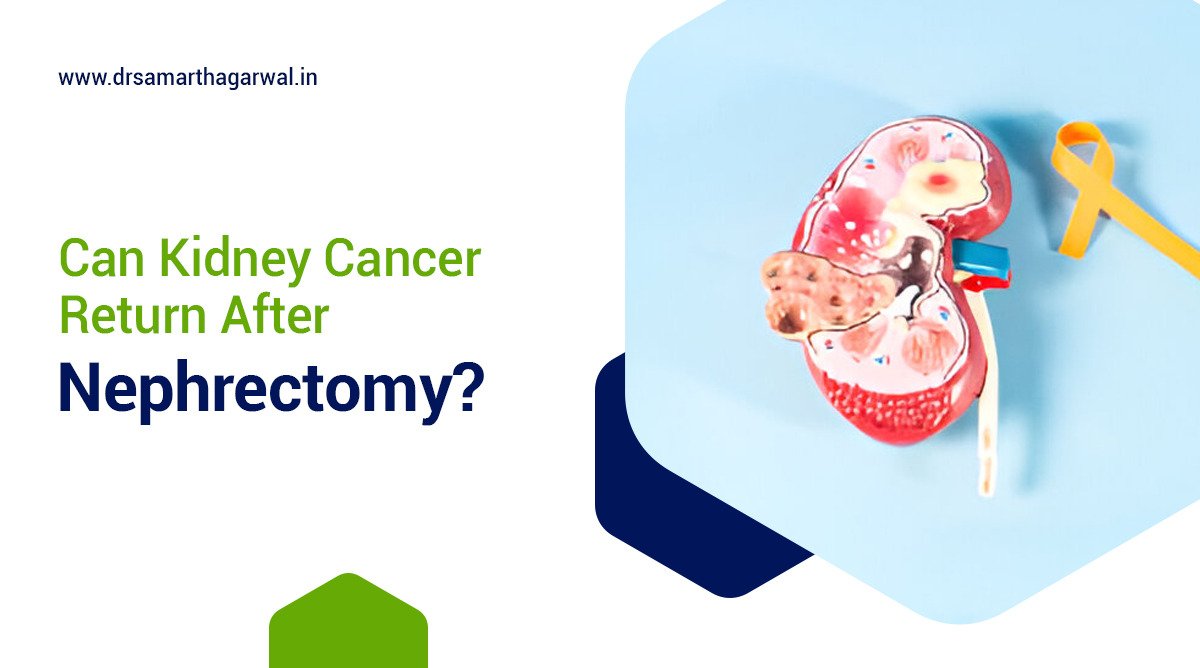The recurrence of kidney cancer after nephrectomy is a significant concern in clinical practice. A study by Adamy, A. (2011) study, ‘Clinical Characteristics and Outcomes of Patients With Recurrence 5 Years After Nephrectomy for Localized Renal Cell Carcinoma.’, analyzed patients who experienced renal cell carcinoma recurrence five or more years after nephrectomy. Out of 2,368 nephrectomies, 44 patients had late recurrence, characterized by fewer symptoms, smaller tumors, and less aggressive disease. The median overall survival from recurrence was 6.1 years, with a 5-year survival rate of 85% for patients at favorable risk and 14% for those at intermediate risk. Incidental recurrence showed a 72% 5-year survival rate, while symptomatic recurrence had a 39% rate. Favorable Memorial Sloan-Kettering Cancer Center risk scores and the absence of metastatic symptoms were associated with longer survival.
What is Nephrectomy?
Nephrectomy is the surgical removal of one or both kidneys. It is most commonly performed to treat kidney cancer, particularly renal cell carcinoma, but it may also be conducted for various other kidney diseases.
This invasive surgery is indicated for a range of underlying conditions, including severe kidney damage, tumors, and chronic inflammation. Performing nephrectomy for kidney cancer is crucial, as it removes cancerous tissue and halts its progression.
By excising the affected kidney, the surgery reduces the risk of metastasis and consequently improves the prognosis. Additionally, nephrectomy may be part of a multi-modal treatment plan that includes other therapies, such as chemotherapy or radiation, depending on the patient’s overall health and specific diagnosis.
Types of Nephrectomy Procedures
Nephrectomy can be classified into two types: radical nephrectomy and partial nephrectomy. In a radical nephrectomy, the entire kidney, as well as the surrounding tissues and lymph nodes, are removed. In contrast, a partial nephrectomy involves the removal of only the tumor along with a small margin of healthy tissue to preserve kidney function. Understanding the differences between these nephrectomy approaches is crucial for patients as they navigate treatment options for kidney cancer.
Radical nephrectomy is typically performed for larger tumors or those that have invaded surrounding structures, as achieving negative surgical margins is essential to ensure that all cancer cells have been removed. On the other hand, partial nephrectomy is preferred for smaller tumors, particularly when preserving renal function is important to avoid chronic kidney disease.
While radical nephrectomy is considered a more aggressive treatment option, it carries greater risks, such as increased blood loss during the procedure and longer recovery times. Partial nephrectomy, which can often be performed using minimally invasive techniques, offers advantages such as shorter hospital stays and quicker recovery times; however, it does come with a higher risk of cancer recurrence at the surgical site.
Factors that Influence Cancer Recurrence
Several factors are associated with the recurrence of kidney cancer after nephrectomy. These include tumor grade, positive surgical margins, and the patient’s overall health status, which plays a crucial role in determining cancer progression and the response to treatment.
Stage and Type of Cancer
The stage and type of kidney cancer, particularly renal cell carcinoma, are crucial factors in assessing the risk of recurrence after nephrectomy, as advanced stages are typically linked to poorer disease-free survival rates.
Understanding this is important for both patients and healthcare providers, as higher stages of cancer are associated with a significantly increased likelihood of recurrence, especially when the cancer has metastasized beyond the kidney.
Research indicates that patients with Stage II and higher renal cell carcinoma face substantial risks that warrant close postoperative monitoring. Additionally, it has been demonstrated that adjuvant therapies may provide added benefits in such cases.
Overall Health and Lifestyle Factors
Several factors influence health outcomes, including overall health, lifestyle choices, and the presence of conditions such as diabetes. These factors highlight the importance of holistic patient care and the need for lifestyle modifications to improve results.
The following are some of the most effective ways to reduce the chances of recurrence:
- Following a balanced diet that includes appropriate amounts of fresh fruits, vegetables, and whole grains, while ensuring proper hydration.
- Engaging in regular physical activity, which helps maintain physical well-being and enhances mental health, helping withdividuals in coping with the emotional challenges that may arise during post-surgery recovery.
- Controlling and treating existing chronic illnesses, such as hypertension and obesity, is essential for overall health.
Additionally, regular engagement with healthcare providers for routine check-ups and personalized care plans can further enhance recovery and promote longevity.
Signs and Symptoms of Recurrent Kidney Cancer
Recurrent kidney cancer symptoms and signs, such as persistent abdominal pain, hematuria, and unexplained weight loss, should be identified early to ensure that appropriate interventions can be implemented.
Therefore, patients need to be monitored regularly, and diagnostic testing—such as imaging and blood tests—should be conducted when necessary.
Identifying Warning Signs
Recognizing the warning signs of kidney cancer recurrence is essential, as symptoms such as fatigue, persistent pain, and changes in urinary patterns may signal the need for medical evaluation and follow-up care.
After nephrectomy, patients should also be vigilant for any unexplained weight loss, swelling in the legs, or abnormal lab results, as these may indicate potential complications or recurrence.
Regular follow-up visits with healthcare providers are crucial for assessing health status and detecting early signs of issues. Effective communication plays a key role in this process, allowing patients to ask questions and report any concerning changes in their health.
Building a trusting partnership with healthcare providers can facilitate timely interventions and provide reassurance during the post-operative recovery period.
Treatment Options for Recurrent Kidney Cancer
Treatment options for recurrent kidney cancer include Surgical Resection, Minimally Invasive Procedures, Ablative techniques, radiotherapy or medical therapy.
Here are the common treatment options for recurrent kidney cancer:
Surgical Resection
Involves wide surgical excision using radical or partial nephrectomy to remove recurrent tumors; this helps by aiming to achieve negative margins and potentially improving long-term survival outcomes.
According to Acar, Ö.(2016) study, ‘Surgical management of local recurrences of renal cell carcinoma’., discusses the surgical management of local recurrences of RCC, noting that surgical resection, either through radical or partial nephrectomy, remains the primary treatment. For recurrences, wide surgical excision with negative margins is recommended, though repeat surgeries can be complicated. Open surgery has shown a 50% 5-year cancer-specific survival rate, while minimally invasive or non-surgical options like cryoablation or radiofrequency ablation are less established. In some cases, adjuvant radiotherapy or medical treatment might be necessary.
Minimally Invasive Procedures
Encompasses techniques such as laparoscopic or robotic-assisted surgery designed to reduce trauma and speed up recovery; this helps by decreasing surgical morbidity and enhancing patient recovery.
Ablative Techniques
Refers to nonsurgical options like cryoablation that destroy cancer cells via freezing; this helps by offering an alternative treatment for patients who may not be ideal candidates for surgical intervention.
Combination Treatments
Combines traditional surgery with radiotherapy or medical therapy, addressing both local tumor control and systemic disease; this helps by potentially enhancing overall treatment efficacy, particularly in challenging or aggressive cases.
Repeat Surgical Thrombectomy
Involves the surgical removal of recurrent venous tumor thrombi; this helps by providing a technically feasible option for tumor resection, although it is generally associated with a higher risk of metastatic progression and poorer survival outcomes.
Systemic Chemotherapy Options
Uses regimes such as rechallenging with carboplatin-gemcitabine, especially for metastatic renal collecting duct carcinoma; this helps by inducing delayed but durable complete responses in selected chemo-responsive patients.
Patient-Specific Considerations for Late Recurrence
Applies tailored treatment approaches for recurrences occurring more than 5 years after nephrectomy, often marked by smaller tumors and less aggressive disease; this helps by offering individualized therapy that can extend median overall survival and improve patient prognosis.
Preventing Recurrence of Kidney Cancer
Preventing the recurrence of kidney cancer after nephrectomy involves regular follow-up with healthcare providers, lifestyle modifications, and adherence to cancer surveillance protocols.
These strategies work in tandem to enhance patient outcomes and increase disease-free survival.
Follow-up Care and Lifestyle Changes
Effective follow-up care and appropriate lifestyle changes are essential for managing kidney cancer survivors, as they reduce the risks of recurrence and help maintain overall health.
Regular follow-up appointments with healthcare providers are necessary to ensure optimal outcomes. Typically, follow-up visits are scheduled every three to six months for the first two years after treatment, transitioning to annual appointments for the remainder of the survivor’s life.
During these visits, imaging tests such as CT scans or ultrasounds, along with blood tests, are conducted to assess kidney function and the general health of cancer survivors.
Plus regular check-ups, and adopting a healthy lifestyle are crucial for cancer prevention. A diet rich in fruits, vegetables, and whole grains, coupled with regular physical activity, helps maintain a healthy weight. Additionally, limiting alcohol intake and quitting smoking are important lifestyle changes that promote the long-term health of kidney cancer survivors.

Contact Dr. Samarth Agarwal if you have any questions or concerns about kidney cancer!




